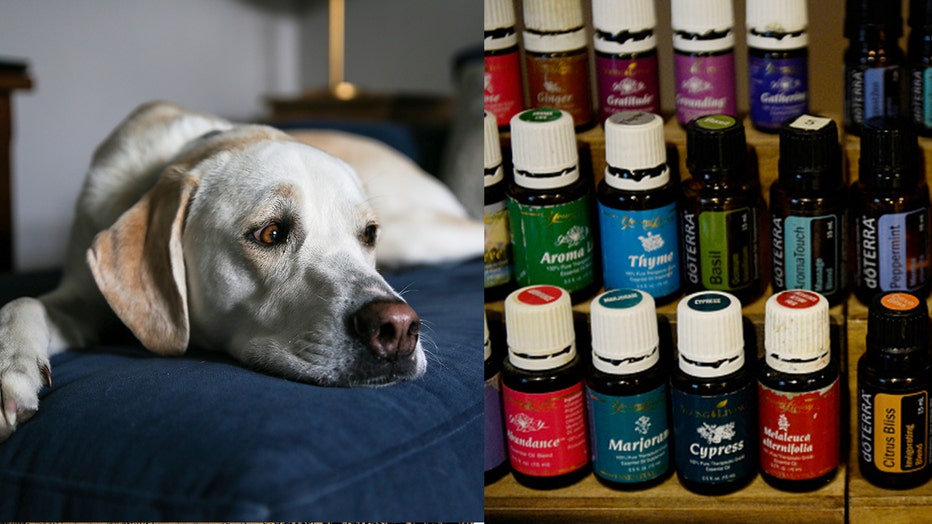Essential oils often used in diffusing devices can be harmful to cats and dogs
LOS ANGELES - Essential oils and diffusing devices are becoming increasingly popular, and as the holidays approach, it’s likely that many people will be giving or getting them as gifts — but those soothing oils could be harmful to pets in the home if not used correctly.
Essential oils are derived from highly concentrated plant substances and can be used safely to treat some ailments in dogs, according to the American Kennel Club.
Many holistic veterinarians incorporate essential oils into their practices, but the AKC warns, “without proper professional guidance, it’s best to avoid using essential oils topically or directly on your dog."
Instead, the AKC suggests sticking to expertly formulated products that are formulated dog-safe essential oils.
Some common essential oils which are toxic to dogs include oil of cinnamon, citrus, pennyroyal, peppermint, pine, sweet birch, tea tree (melleuca), wintergreen and ylang ylang.
“Not understanding [essential oils] or not being educated on appropriate use is what tends to cause the concerns that we see with dogs,” said Jo Marshall, a senior veterinary information specialist.

Essential oils and diffusing devices are popular holiday gifts, but did you know that they can cause harm to your pets? (LEFT: Nathan Klima for The Boston Globe via Getty Images. RIGHT:)
Cats are much more sensitive to essential oils than their canine counterparts, according to the Pet Poison Helpline, due to the fact that they lack an essential enzyme in their liver which causes them to have trouble metabolizing and getting rid of certain toxins.
Some of the essential oils known to be dangerous for cats are oil of wintergreen, oil of sweet birch, citrus oil (d-limonene), pine oils, Ylang Ylang oil, peppermint oil, cinnamon oil, pennyroyal oil, clove oil, eucalyptus oil and tea tree oil. The more concentrated the oil, the more dangerous it is to your cat.
Some essential oils also contain phenols and phenolic compounds, to which cats are extremely sensitive.
The type of diffuser used can also have an impact on the level of risk posed to cats.
Passive diffusers work by evaporating the oil, and the main hazard posed to cats from this kind of diffuser is respiratory irritation. If a passive diffuser gets tipped over (a risk any cat owner is intimately familiar with) or the oils within somehow get onto a cat’s fur or skin, other symptomatic irritations can occur.
“Inhalation of strong odors or fragrances can cause some cats to develop a watery nose or eyes, a burning sensation in the nose/throat, nausea leading to drooling and/or vomiting, and difficulty breathing,” the Pet Poison hotline explains. “Difficulty breathing in a cat is evidenced by labored breathing, fast breathing, panting, coughing, or wheezing. NONE of these signs are normal in cats.”
If your cat does exhibit any such symptoms, it’s important to first get them to an area with fresh air, and then to seek veterinary attention.
Active essential oil diffusers pose an even greater risk to cats. They are newer on the market, and they work by diffusing microdroplets or particles of oil into the air. Nebulizing and ultrasonic diffusers both fall into this category. The droplets from these diffusers can get onto cats’ skin, where it can be absorbed directly, or on their fur, where it will likely be ingested when the cat grooms.
“Like oil and water, essential oils and cats really do not mix,” says the Pet Poison Hotline.
If you do use essential oils in your home, there are several precautions you can take to limit the risks of causing harm to your pets, according to Pet Health Pharmacy. This includes keeping diffusers in areas where pets cannot access the oils, only using diffusers in rooms that your pet can easily move in and out of, never leaving a diffuser unattended, limiting the amount of time the diffuser is used and never using concentrated oils directly onto your pet.
It’s also important to know and be vigilant for the symptoms of toxicity in your pet if you use essential oils at home. Gagging, vomiting, drooling, difficulty breathing, ataxia (wobbliness), respiratory distress, itching or rash and behavior changes (depression, stumbling, trembling, etc.) can all be signs of essential oil toxicity.
If your pet does ingest essential oils or seems to be presenting symptoms of toxicity, it’s important to get them help as quickly as possible.
The Pet Poison Helpline and Poison Control can both offer assistance in emergency situations
Pet Poison Helpline
- Phone Number – 1-855-213-6680
Poison Control
- Phone Number – 1-800-222-1222
- or Text POISON to 484848

